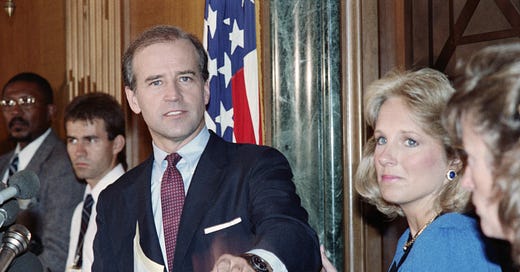THE FIRST TIME JOE DROPPED OUT
What does Biden’s failed campaign for the 1988 Democratic presidential nomination tell us about his future?

So what will happen now as the White House has gone into denial mode about the president’s weak performance in last week’s debate with Trump? The debate produced no rational discourse on the major issues of our time, and it’s unlikely we will hear anything of substance through the remainder of the campaign if Biden chooses to stay in the race.
On that question, I turned the other day to Richard Ben Cramer’s What It Takes: The Way to the White House (1992), perhaps the best book on a presidential campaign in our time. Cramer spent six years researching and writing the book. He reported on six Democratic and Republican contenders, including Biden, who withdrew after allegations of plagiarism and lying. (Cramer, who died of lung cancer in 2013, was a friend of mine.)
Cramer was given broad access to Biden and his family, including his wife Jill. Biden was elected to the Senate from Delaware in 1972 by a few thousand votes at the age of twenty-nine, after a come-from-behind race against incumbent J. Caleb Boggs, a two-term moderate Republican who had served in the US Army in Normandy, Germany, and Central Europe. Cramer recounts a turning point in a final debate with Boggs—one now filled with irony, considering what happened the other night: “Some wise-ass,” Cramer writes, “asked a trick question about a treaty. . . . Joe happened to know what it was. “But Boggs was confused. He stumbled around. Poor old guy looked terrible! So it came to Biden—and he knew—he could’ve slammed the guy . . . but, no. That was the key. Joe knew exactly how he had to be. If the beloved sixty-three-year-old did not know what the . . . treaty was . . . well, there was only one thing for a twenty-nine-year-old to say:
“Aw, I don’t know that one either . . .”
“That was the moment,” Cramer writes, “Joe knew he had him. It was destiny.”
Things got much more serious during the race for the 1988 Democratic presidential nomination. In the fall of 1987, after months of campaigning, Biden was confronted with a series of lies he had made in earlier campaigns about his academic record and class standing while in law school at Syracuse University. Then came equally serious—and proven—allegations of plagiarism as his campaign speeches came under close scrutiny by the national press. There were things, Cramer writes, that Biden had said during a television interview “about his IQ, and his scholarships, how he graduated with three degrees, at the top of his class.”
“There must have been a hundred press calls,” Cramer writes. The reporters “didn’t want explanations. . . . What they wanted was a comment—to show they’d called; a no-comment was just as good. He’d explain one thing, they’d bring up another.” Biden was by then married to Jill, and, Cramer wrote, she couldn’t stand it. She said, “There’s no way to answer.”
Keep reading with a 7-day free trial
Subscribe to Seymour Hersh to keep reading this post and get 7 days of free access to the full post archives.



